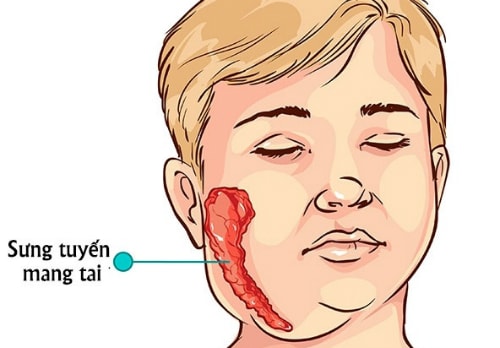Recognizing and treating mumps
In addition to swelling in the parotid area, the patient may have fever, headache, muscle pain, fatigue, and vomiting.
According to the Department of Preventive Medicine, Ministry of Health, mumps, also known as parotitisMumps is an acute infectious disease caused by the mumps virus. The disease is transmitted through the respiratory tract, occurring year-round but often causing epidemics in winter and spring. The disease is common in school-age children and epidemics in schools, military units, etc. Children under 2 years old and the elderly rarely get sick. After contracting the disease, patients have strong immunity and rarely relapse.
The disease is easily recognized by the symptoms of swelling and pain in the parotid area, 1-2 days before, some cases feel pain and difficulty chewing. The parotid area can swell on both sides at the same time and appear very quickly, the night before was normal but the next day it was swollen. There are cases where one side swells and a few days later the other side swells.
The patient may have fever, headache, muscle pain, fatigue, nausea, and vomiting. In most cases, the fever is very mild and lasts one to two days.Usually older children or adults have more severe symptoms than younger children.The disease will gradually heal after a week to 10 days if there are no complications.
 |
| A common symptom of mumps is swelling of the parotid glands. Photo: cdc. |
According to Dr. Pham Dang Dang Khoa, Ho Chi Minh City Preventive Medicine Center, some complications that can occur are nerve damage, encephalitis or meningitis, deafness, and vision loss. A complication that causes concern for parents is orchitis in boys or ovarian inflammation in girls, some cases leading to infertility. DThe main symptoms are swollen, painful testicles. Women feel abdominal pain and pain when touching.
Women who contract mumps in the first 3 months of pregnancy may have a miscarriage or give birth to a child with birth defects. In the last 3 months of pregnancy, the disease can cause premature birth or stillbirth. Other complications include pancreatitis, myocarditis, thyroiditis, optic neuritis causing temporary vision loss, pneumonia, liver damage, bleeding due to thrombocytopenia...
Currently, there is no specific treatment for mumps. The main methods are symptomatic treatment, increased nutrition, body support, early detection and treatment of complications such as orchitis, meningitis, etc.
In uncomplicated mumps, the patient can be cared for at home:
- Pain relief, fever reduction with Paracetamol.
-Drink plenty of water and eat soft, easy-to-swallow foods.
-Rest, you can apply cold compress on the swollen and painful cheek area.
-Take to hospital when seeing patient with severe, unusual symptoms.
Prevent mumps byLimit contact and do not share utensils with people with mumps.Vaccinate children from 12 months of age and give booster shots as directed.Women of childbearing age should follow their doctor's advice about when to get pregnant after mumps vaccination.Patients need to stay at home to isolate for about 10 days to avoid spreading the disease to others.
According to VNE
| RELATED NEWS |
|---|
